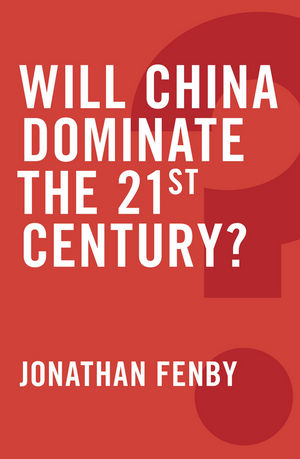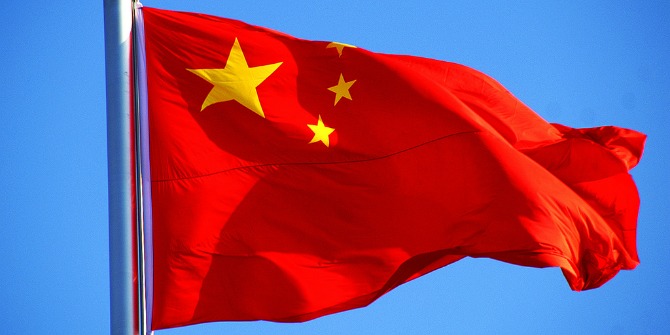
In this short and accessible book Jonathan Fenby successfully traces the huge inadequacies of the Chinese state from suffocating authoritarianism to long term economic mismanagement. The beauty of Fenby’s book is that it is superbly concise; with over 30 years’ experience of covering China, Fenby is able to distil complex ideas down to their core elements and burnish them with accompanying illustrative anecdotes. For students of Chinese politics or international relations this is a book well worth reading, writes Merlin Linehan, but it lacks the details that a more advanced China scholar might crave.
 Will China Dominate the 21st Century? Jonathan Fenby. Polity Press. March 2014.
Will China Dominate the 21st Century? Jonathan Fenby. Polity Press. March 2014.
China has long provided observers in the West with a host of extremes and paradoxes to ponder, a nominally communist authoritarian political system which is nevertheless flexible enough to accommodate a new strain of “red capitalism” and while some fete its record breaking economy as it looks set to outstrip the US in GDP terms, others point to the strains in its banking system and predict a crisis of epic proportions.
One thing is for certain, Jonathan Fenby has written this polemic at the most exciting time to be studying China’s engagement with the rest of the world, as the country continues to press its aggressive economic ambitions alongside a cautious diplomatic and military strategy, all in the shadow of rising political tensions in East Asia.
The book neatly summarizes China’s recent history, propagating the theory that China could outpace the USA to become the world’s foremost power if it continues to follow the trajectory of the last 30 years, before going to demolish that same theory as it discusses the domestic and international challenges that will prevent it from becoming a true superpower.
Students of Chinese economics and politics will probably be fairly familiar with the list of “challenges”, “roadblocks”, and “obstacles” that China faces. For those unaware of current trends on the subject, these include the rebalancing of the economy away from dependence on exports to consumerism, the supposed contradictions of a free market capitalist system governed by an undemocratic government, which – far from liberalising as many in the West might expect – looks set to assert its authority and further clamp down on any dissent or challenge to its rule. The book does not provide any new insights but argues these points persuasively, so readers will be in little doubt that China faces some serious constraints on its power.
The beauty of Fenby’s book is that it is superbly concise; with over 30 years’ experience of covering China, Fenby is able to distil complex ideas down to their core elements and burnish them with accompanying illustrative anecdotes. This book could save readers the time of wading through much longer books, blogs, and articles covering the same themes. Not a word is wasted.
The final chapter effectively draws together the arguments of the previous four and concludes the author’s case that no, China will not dominate the 21st century. Central to this hypothesis is the idea that the central government is too impervious to change and eventually their conservatism will catch them up, stifling reform efforts, putting a brake on the economy and any global ambitions.
Allied to this inflexibility is that in Fenby’s eyes the citizens of China fundamentally do not trust their government, as the book cites “27% of Chinese with a net worth of 100 million Yuan or more have emigrated or obtained foreign passports or residence permits while another 47% per cent were considering leaving the PRC”(p.115). The finding that “more than 85% of millionaires polled in 2012 planned to send their children abroad for education” (p.115) is hardly a vote of confidence.

As well as a lack of credibility in the eyes of its citizens, China faces a major image problem around the world; while some admire its economic rise, for many dictators it is a shining example of progress without the need for democracy. But as the book tells us, for all its admirers it has alienated many others through clumsy diplomacy, an export machine which put other country’s firms out of business, and, most of all, the lack of an attractive political system, as Fenby puts it, no one is protesting on the street in favour of Chinese-style government.
But the contrarian in me immediately thought is there not potential for the Communist Party in China to change and adapt to their current circumstances? After all who would imagine that the same organisation that undertook the Great Leap Forward and the Cultural Revolution is now presiding over “Socialism with Chinese characteristics” – in other words a mixed economy – unthinkable under Chairman Mao’s rule.
If, as Fenby argues, the government realises the limitations of the current economic model (over capacity and growth at all costs) and takes steps to change this, then perhaps there is hope for the country to overcome at least some of the problems facing it. But looking back into history Fenby is pessimistic as to the ability of Chinese dynasties to adapt, citing the fall of the Ming, Machu, and others as proof of the inability of Chinese governments to survive change.
The final chapter also tackles the great unknown of whether China wants (or will want) to dominate the 21st century; students of historical geo-politics will be familiar with the idea that great powers displace the existing hegemons, Germany arguably tried this with the British Empire, and the USA eventually did following the second world war, but there is ambivalence as to whether these powers were trying to become number one or circumstances pushed them into such a position. Similarly with China there is scant evidence in their actions that it has grand global ambitions beyond trade and investment ties and local territorial disputes. Indeed, as Fenby aptly demonstrates, their global military, diplomatic, and soft power footprint is tiny in comparison to their economic might.
Fenby successfully traces the huge inadequacies of the Chinese state from suffocating authoritarianism to long term economic mismanagement and provides a compelling argument against a the concept of a global Pax-Sinica. For students of Chinese politics or international relations this is a book well worth reading, but it lacks the details that a serious China scholar might crave. Others like China the Partial Power by David Shambaugh, or Minxin Pei’s China’s Trapped Transition offer much more to those wanting to understand in greater depth the various competing schools of foreign policy thought emanating from Beijing or the complex issues around economic transition and how these will alter China’s ability or willingness to project power around the world.
————————————-
Merlin Linehan is currently writing a book on trade and investment between rising powers and previously worked as a financial analyst and consultant in the fields of SMEs, clean energy and donor finance for the European Bank for Reconstruction and Development. Merlin holds an MSc in Finance and Financial Law from SOAS. Merlin blogs on South –South trade at thekularingtradeblog.com and tweets @MerlinLinehan. Read more reviews by Merlin.








3 Comments